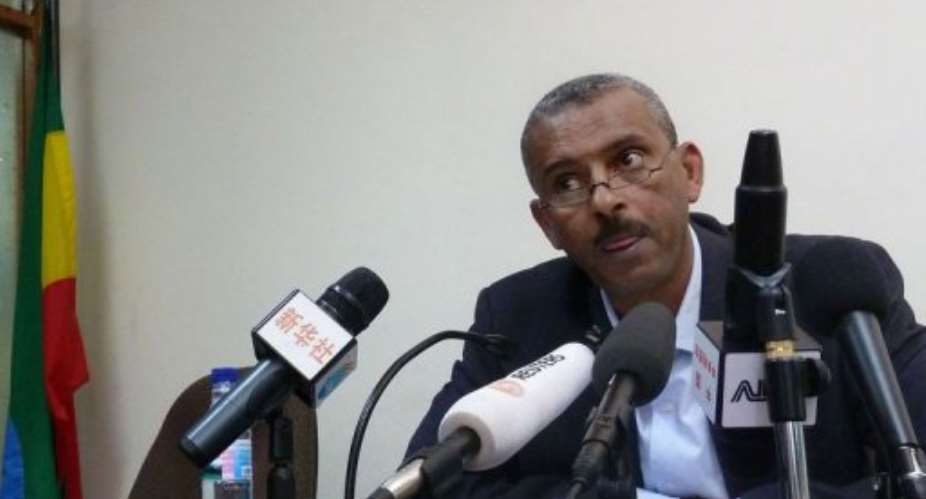ADDIS ABABA (AFP) - Ethiopia attacked an Eritrean military base Thursday over the killing of five European tourists on its territory this year, accusing its neighbour of training "hit-and-run terrorists".
Amid international appeals for restraint, government spokesman Shimeles Kemal threatened further attacks against its neighbour as long as it posed a threat to its security and warned Eritrea against any retaliation.
"Early this morning Ethiopian defence forces attacked a military post inside Eritrea," Shimeles told reporters, accusing Eritrea of using the base to train and arm "hit-and-run terrorists".
"These groups are operating in the Afar area in Ethiopia.
"We know for certain that the Eritrean government harbours, supports, trains and deploys subversive groups that occasionally launch attacks on infrastructure inside Ethiopia," said Shimeles.
The attack took place 16 kilometres (10 miles) inside Eritrea, but Shimeles did not say what the casualties were on either side.
In January, two Germans, two Austrians and one Hungarian were killed in an attack on the slopes of Ethiopia's famed Erta Ale volcano in Afar.
Ethiopia blamed arch foe Eritrea for the attack on the tourists, a charge that Eritrea denied.
"The recent attack against European tourists is one of the reasons for this retaliation," Shimeles said.
The killing of the tourists had rekindled tensions between the two Horn of African nations, raising fears of another war between them.
Shimeles said war was not likely to erupt, insisting that Ethiopia was committed to peaceful negotiations.
But he warned: "As long as Eritrea remains a launching pad for attacks against Ethiopia, similar measures will continue to be taken."
And if Eritrean forces retaliated, he warned, "the results would be disastrous".
The United States urged both sides to show restraint.
"We have heard the government's reports that its forces struck military posts inside Eritrea today," State Department spokeswoman Victoria Nuland told reporters.
"We are obviously calling on both sides to exercise restraint and to avoid any further military action.
"We are seeking further clarification from them as to their intentions," Nuland said when asked if the United States accepted Ethiopia's explanation for launching military action.
France also called on "both states to avoid any military escalation and, more broadly, to avoid anything that could raise tension.
"France is convinced that the only way of resolving the differences between the two countries is through dialogue and negotiation," French foreign ministry spokesman Bernard Valero said.
He said the Ethiopian army conducted an operation in the night of Wednesday to Thursday "aimed at destroying three camps in southeast Eritrea within which Addis Ababa accuses Asmara of training rebel groups operating on Ethiopian territory".
"Following these new events, which come only a few weeks after attacks on foreign tourists in Ethiopia, France expresses its deep concern."
In January 2010, Addis Ababa accused Eritrea of launching attacks along their disputed border but said its troops had driven off the assault.
The same month Ethiopia said it had arrested three people trying to cross into the country to carry out attacks and accused Eritrea of having trained them.
Ethiopian Prime Minister Meles Zenawi in April accused the Eritrean government of trying to destabilise Ethiopia by backing rebel groups such as the Oromo Liberation Front, the Ogaden National Liberation Front -- and the Somali Al Qaeda-affiliated Shebab.
He told lawmakers that Ethiopia was ready to help the people of Eritrea topple the regime of Issaias Afeworki, but ruled out a military invasion.
Meles said they had no intention to "jump into their country but we need to extend our influence there. If the Eritrean government tries to attack us, we will also respond."
Eritrea broke away from Ethiopia and won independence in 1993 after a 30-year struggle. The two countries fought a border war in 1998-2000, which left at least 70,000 dead.





 Meta releases new version of conversational AI across its platforms
Meta releases new version of conversational AI across its platforms
 Cape Town named Africa’s Best Airport 2024 by Skytrax
Cape Town named Africa’s Best Airport 2024 by Skytrax
 Bono East: Four injured after hearse transporting corpse crashes into a truck
Bono East: Four injured after hearse transporting corpse crashes into a truck
 ‘Be courageous, find your voice to defend our democracy’ — Sam Jonah urges journ...
‘Be courageous, find your voice to defend our democracy’ — Sam Jonah urges journ...
 Exodus of doctors, nurses and teachers have worsened because of unserious Akufo-...
Exodus of doctors, nurses and teachers have worsened because of unserious Akufo-...
 2024 election: Avoid insults, cutting down people in search of power – National ...
2024 election: Avoid insults, cutting down people in search of power – National ...
 ‘You passed through the back door but congratulations’ — Atubiga on Prof Jane Na...
‘You passed through the back door but congratulations’ — Atubiga on Prof Jane Na...
 Government’s $21.1 billion added to the stock of public debt has been spent judi...
Government’s $21.1 billion added to the stock of public debt has been spent judi...
 Akufo-Addo will soon relocate Mahama’s Ridge Hospital to Kumasi for recommission...
Akufo-Addo will soon relocate Mahama’s Ridge Hospital to Kumasi for recommission...
 We must not compromise on our defence of national interest; this is the time to ...
We must not compromise on our defence of national interest; this is the time to ...
